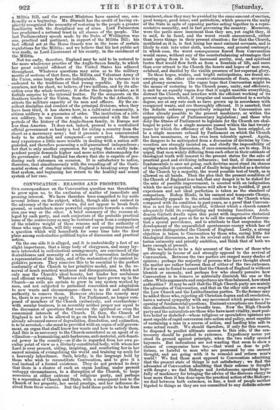MILITARY CHANGES IN EUROPE.
WarrE Louis Napoleon is canvassing the South of France for Im- perial suffrages, the police have orders to carry out a more searoh- ing and strict disarming of the people. Persons, it is remarked in an order to several Moines, possess arms under an idea that they have a right to do so, because they have purchased them, or have possessed them for a long time : but the police are to disabuse them of that delusion, by taking away the arms. This is but one stage, and it is a very advanced stage, in that process which is disarming the French people, and at the same time more and more separating from the people a standing army to monopolize the possession of arms. The utility of such a separated, non-national army, we saw on the 2d of December. But the Lion is so much in love with the Virgin Empire, that it consents to have its claws pared again, even down to the roots.
There pis a peculiar circumstance in this disarming of France, for which we do not remember any exact precedent in the history of the world. In recent years, until the present administration, France was a state in which the bulk of the nation possessed some share of material power ; in that respect differing on the one side from England, where a standing army has existed ever since the war, and from the great states of Europe on the other side, where such enormous armies have been constructed for the military occu- pation of Europe. France joins that system, and thus not only introduces a certain sort of uniformity of plan, common to Austria and to England, and now unbroken by France lying between, but also brings to our very door that system of military government which already extends from the White Sea to Cape Spartivento. It is needless to point out the immense engine which a Continental alli- ance might bring to bear against England from coasts within sight of her own shores, or the excessive uncertainty introduced into all future calculations by the impossibility of trusting to our immedi- ate neighbour.
It is a fact not less remarkable, nor less consolatory, that al- though death has deprived us of the chief who vindicated the power of England against the last combination that threatened her, he bequeathed to us the aid of his advice and influence in de- parting from that system which has been common to England and to Austria, as it is now to the whole of Europe from Connemara to the Carpathians. It is true that the formation of a Militia is but in embryo—that we have only made a beginning; still we hare made that beginning. And if some hesitancy and misgiving beset public men, whose instincts, almost more than their reason, made them fall in with that reform, the unexpected concurrence which the hesitaters gave to each other on the main object, with the subsequent march of events, will help to strengthen an opi- nion which has sprung up without any preliminary theory, in its concrete and practical shape. All parties are united in the reform, save one, or rather a section of one. The late Ministers introduced a Militia 13m, and the present Ministers have carried one, con- fessedly as a beginning. Mr. Disraeli has the credit of having ex- plicitly recognized the necessity of restoring to the people a greater familiarity with the disciplined use of arms. Lord Palmerston has proclaimed a national trust in all classes of the people. The last Parliamentary speech made by the Duke of Wellington was one, practical and pertinent, in support of the Militia Bill; his last official act at the Horse Guards was in the issue of certain regulations for the Militia; and we believe that his last public act was made, as Lord-Lieutenant of his county, in the enrolment of the Militia.
Not too early, therefore, England may be said to be restored to the more wholesome practice of the Anglo-Saxon family, to which her great colonial offshoot of the United States has adhered throughout. Whatever questions may arise as to the military merits of sections of that force, the Militia and Volunteer Army of the Union, some large facts are indisputable. By its veterans it is endeared to the traditions of that young republic. By its vast numbers, not far short, we believe, of two millions, and by its allo- cation over the whole territory, it defies the foreign invader, as it forbids surprise by the internal traitor. By the conquests on the Southern border of the Union, from the Pacific to the Atlantic, it attests the military capacity of its men and officers. By the ex- cellent discipline and conduct of the principal divisions, when they have been tried, it has shown how, in a cultivated community, a citizen soldiery is a guarantee of order. The institution of a citi- zen soldiery, in one form or other, is associated with the best periods of the history of the Anglo-Saxon family, in Europe not less than America. It does not, indeed, present to a centralized official government so handy a tool for ruling a country from the closet as a mercenary army ; but it presents a less concentrated body to be attacked and conquered—or corrupted. Statesmen may experience a little more trouble in dealing with a nation self- guarded, and therefore possessing a self-guaranteed independence ; but that is only another expression for saying that a really inde- pendent people demands higher and more active statesmanship for its governance ; and England has shown that she is capable of pro- ducing such statesmen on occasion. It is satisfactory to notice, therefore, that simultaneously with the rounding-off of the Conti- nental system of standing armies, England is breaking away from that system, and beginning her return to the healthy and sound system of her race.



























 Previous page
Previous page